2G & 3G switch-offs: when each UK mobile network's doing it

The retailers featured on this page may compensate us when our readers follow links to their websites and make a purchase. More
We explain what it will mean for coverage, calls and data when mobile networks begin phasing out 3G and 2G, and which ones will be last. Last updated: 11th May 2023.
What’s happening with 2G and 3G?
Mobile networks are switching off their 2G and 3G
You may or may not know that every UK network is planning to switch off their 3G and 2G networks by at least 2033. That means you’ll only be able to use 4G and 5G in the future.
This is a joint ambition between the government and the main mobile networks to make signal more efficient and give customers faster data speeds. In effect this will expand 4G and 5G into more areas.
However, there are some potential downsides to this move that are worth knowing about, especially if you’re on an older device that can’t connect to 4G or 5G.
In this guide we’ll go over everything you need to know about the 2G/3G switch off, how it might affect you and when each main network are doing it.
Useful link: Ofcom’s guide to the UK’s 2G/3G switch off
3G switch off and what it means
How 3G switch off will affect your network experience
3G is used to provide both call and data signal. When it was first introduced it provided much faster data and better quality calls than 2G. But now networks are looking to replace it with 4G and 5G signal.
However, this change could negatively affect indoor signal. This is because 4G signal on half the networks is broadcast on frequencies that aren’t as good at getting through building materials as 3G.
If your phone doesn’t support WiFi calling then you might struggle to make calls indoors. And if your phone doesn’t support 4G calling you’ll only be able to make calls over 2G, which will also be shut off in the future.
While the 3G shut off might have some upsides for those on more modern devices, users on older devices will struggle to connect to calls once it’s gone.
Useful link: How we rank each networks’ WiFi calling schemes
The 3G turn off will improve most users’ data experience
Like we said above, you can call and use data over 3G. So once 3G is shut off you will notice a difference to your data experience as well as how you make calls.
The good news is that each network will replace their old 3G transmitters with 4G or 5G ones, meaning you’ll get faster data speeds in these areas so long as your phone can use these types of signal.
However, if your device doesn’t support these types of signal you’ll be stuck on 2G for data once 3G is shut off. Not only is 2G much slower than 3G, but it will also be shut off by 2033.
So if you’re on a 3G-only device, you’ll struggle to connect to data on the go once 3G has been shut off. We go over when each main network is shutting off their 3G in the next section.
Useful link: Which networks have the fastest 5G speeds?
Each network will shut off their 3G at different times
Most of the main UK networks have provided a timeframe for their 3G shut offs and have given more details on whether they’re just shutting off their 3G masts or slowly converting them to 4G/5G.
Vodafone will remove 3G by the end of 2023. In fact they’ve already removed it in Plymouth and Basingstoke. They’re removing 3G in the areas they already have good 4G signal, so it’s still a slow phasing out of 3G.
EE have said they will remove 3G at least by the end of 2024. However, from what they’ve said it seems like it will be shut off almost all at once, rather than a slow and steady process. We can’t say for sure yet.
Three will also phase out 3G in 2024. However, Three don’t have 2G at all. That does mean they’ll phase out 3G more slowly, but if you have a 3G-only phone you won’t get signal at all on Three after that.
O2 haven’t given an exact year for their 3G switch off. That means it might happen at the latest in 2033, but we can’t say for sure. And we don’t know if their switch off will be gradual or abrupt.
Because of that, we think O2 are the safest network to be on if you’re on a 3G-only phone as you should still be able to use 3G for a while. But if this changes we’ll update the page as soon as the information comes out.
Useful link: Our full review of O2
2G switch off and what it means
The 2G switch off has advantages and disadvantages
2G is primarily used for making calls, especially in remote areas. You can technically use data over 2G, but speeds over 2G are almost unusably slow. So the biggest change will be to call signal when it’s switched off.
The 2G switch off will have some positive effects. Most importantly it will allow networks to provide 4G and potentially even 5G on old 2G masts and frequencies. This will give faster data signal to more users in more areas.
But, once 2G is switched off it will mean that users on 3G-only phones and devices without WiFi/4G calling will no longer be able to make calls (because 3G will also have been scrapped). Lots of people are going to need new phones.
It may also leave some rural places with worse call signal if 4G is unable to get there. Overall the 2G switch can be a good or a bad thing depending on your phone and where you live.
Useful link: Our guide to the best WiFi calling networks
No network has given an exact year for shutting off 2G
As of yet, none of the main UK networks have released an exact timeframe for turning off their 3G network. But they have agreed to switch it off by 2033 at the latest.
Three doesn’t offer 2G in the first place, so once they’ve shut off their 3G the only way to connect to calls will be over 4G or WiFi using 4G/WiFi calling. If your phone doesn’t support that you’ll be stuck.
EE have said they’ll shut down 2G “later in the decade” which means they may turn it off before 2033. Neither Vodafone or O2 have said they’ll shut it down any time soon, so it will be closer to 2033 that it happens.
So if you’re on a 3G-only phone and don’t want to upgrade any time soon, we think you’ll be safest on O2 or Vodafone as you’ll most likely be able to use 2G the longest on them.
Useful link: What EE say about turning off their 2G
Compare SIM only plans
Find a deal that best suits your needs
Plan
Data: (0MB+)
Minutes: (0+)
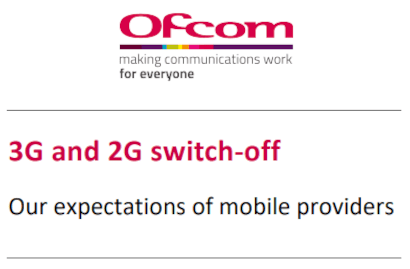


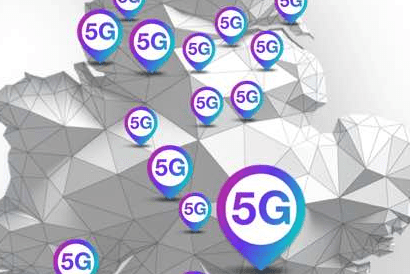
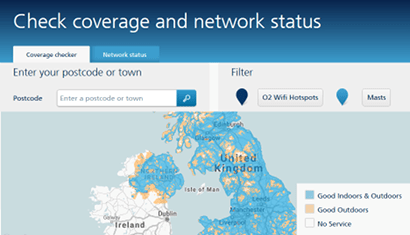
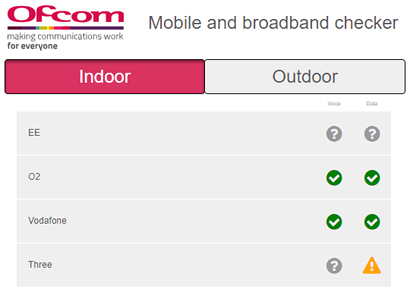
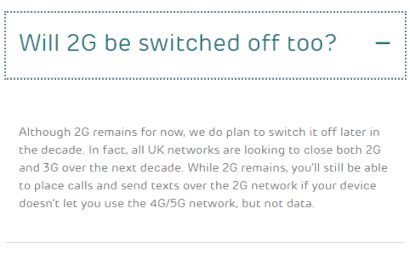






















 Thanks, we'll send that out now. Please check your inbox for our email.
Thanks, we'll send that out now. Please check your inbox for our email.